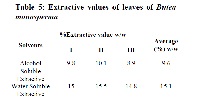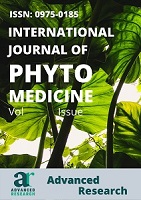Evaluation of in vitro antihelmintic activity of leaves of Butea monosperma
Keywords:
Anthelmintic Activity, Butea Monosperma, Pheretima Posthuma, Ascardia Galli, Raillietina spiralis, DMF (di-methyl formamide)Abstract
The preliminary phytochemical screening was carried out on the crude extracts of the leaves of Butea Monosperma Lam along with ash values and extractive values on the powdered drug. The crude extracts were investigated for their anthelmintic activity against earthworms (Pheretima posthuma), roundworms (Ascardia galli.) and tapeworms (Raillietina spiralis). Three concentrations (25, 50 and 100 mg/mL) of each extract were studied in activity, which involved the determination of time of paralysis and time of death of the worm. Alcohol and ethyl acetate extracts exhibited significant anthelmintic activity at highest concentration of 100 mg/mL. Albendazole in same concentration as those of extracts was included as standard reference and Di-methyl formamide as control. The anthelmintic activity of alcohol and ethyl acetate extracts of leaves of Butea Monosperma has therefore been demonstrated for the first time.
References
Chatterjee A, Chandra S. Anonymous. The
Treatise on Indian Medicinal Plants Vol II,
Pakrashi, editors. Publication and Information
Directorate, New Delhi, 1995: 73-74.
Kiritikar KR and Basu BD. Ind. Medicinal
Plants, Ed 2nd, Vol. IV, International book
distributor, Deharadun, India, 1996: 1096-
Asolkar LV, Kakkar KK. Glossary of Indian
Medicinal Plants with Active Principle, PartI, 148-149.
Chopra RN. Glossary of Indian Medicinal
Plants, CSIR, New Delhi, 42
Harborne JB. Phytochemical Methods, Ed 3rd,
Chapman and Hale Publishers, London, 2007:
-9
Anonymous, Pharmacopoeia of India, Vol II,
Govt. of India, Ministry of health and Family
Welfare, Controller of Publication, New
Delhi, 1996, 53-54
Pratt RT, Chess ER. Fluorescence of
powdered vegetable drugs in particular to
develop system of identification. J Am
Pharm Ass. 1949; 38:324-331
Kakoski CJ, Kakoski RJ, Sharma M.
Fluorescence of powdered vegetable drugs
under ultraviolet radiations. J Am Pharm Ass.
;47:715-717
Kokate CK, Purohit AP, Gokhale SB.
Practical Pharmacognocy, Ed 30, Nirali
Prakashan, Pune, 2004: 593-597
Ajaiyeoba EO, Onocha PA, Olarenwaju OT.
In vitro anthelmintic properties of Buchholzia
coriaceae and Gynandropsis gynandra extract.
Pharm Biol. 2001; 39: 217 -20.
Vigar Z. Atlas of Medical Parasitology. Ed
nd, P.G. Publishing House, Singapore,
: 242.
Dash GK, Suresh P, Kar DM, Ganpaty S,
Panda SB. Evaluation of Evolvulus alsinoides
Linn. for anthelmintic and antimicrobial
activities. J Nat Rem. 2002; 2: 182-185
Shivkumar YM, Kumar VL. Anthelmintic
activity of latex of Calotropis procera.
Pharma Biol. 2003; 41: 263-265
Kaushik RK, Katiyar JC, Sen AB. Studies on
the mode of action of anthelmintics with
Ascardia galli as a test parasite. Indian J Med
Res. 1974; 64: 1367-75.
Yadav AK. Anthelmintic activity of Gynura
angulosa against Trichinella spiralis
infections in mice. Pharmacology online
; 2:299-306
Sathe BS, Sreenivasa GM, Jayachandran E,
Sreenivasa RD and Naragund LVG.
Anthelmintic Activity of imidazolyl fluro
benzthiazole, Int. J. Chemical Science, 2006;
: 545 -552.
Mathew AS, Patel KN and Shah BK.
Investigation of Anthelmintic potential. Ind.
J. Natural Product, 2004; 14(1): 11-14
Bate-Smith EC. The phenolic constituent of
plants and their taxonomic significance,
dicotyledons. J Linn Soc Bot. 1962; 58: 95-
Martin RJ. Mode of action of anthelmintic
drugs. Vet J 1997; 154: 11-34.



